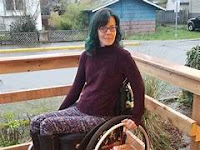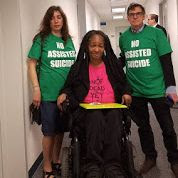Alex Schadenberg
Executive Director, Euthanasia Prevention Coalition
This is an interesting article since it was published by a magazine that is not known for handling this topic. The article begins by stating that Canada was built on a history of eugenics and then it states, what most people are unaware of, that Tommy Douglas was a eugenicist. Loeppky states:
The website for Disability Day of Mourning, a project by the Autism Self Advocacy Network that commemorates disabled children or adults who were killed by their parents or caregivers, counts a high number of Canadians among its entries. It is against this backdrop of ableist violence that many Canadian disability activists are fighting the implementation and expansion of Medical Assistance in Dying (MAID), often known in America as assisted suicide.
The article explains that disability rights advocates say that assisted suicide has dangerous and disproportionate affects on them based on levels of poverty, homelessness, poor mental health care, and other barriers to quality of life that affect members of the disability community.
The article explains Canada's MAiD (euthanasia) history. Canada's euthanasia law was originally passed in 2016 followed by a Québec court decision in 2019 which led to the Canadian government expanding the euthanasia law in 2021. The article states:
In 2021, Canada’s Liberal (center left) government successfully passed legislation to expand MAID via Bill C-7. Proponents of the bill say it gives disabled Canadians the opportunity to have more control when choosing death. But resistance to Bill C-7 has mounted. A recent letter (that some don't think went far enough) signed by representatives from 50 organizations called for the government to reconsider a scheduled expansion that would enable those with mental health disabilities to access MAID. After another set of hearings, the government has postponed this controversial expansion until March 2024. In other words, it pressed the pause button.
But what impact is MAID already having? To use a metaphor, seven years of growing poisonous trees has yielded fruit. Examples of related dangers range across the country, but the main risk, as activists see it, is that disabled people are being coerced into accepting MAID or made to feel like it’s their only option because of a lack of societal support. One of the main pro-MAID organizations, Dying With Dignity, would like to see provisions expanded to include those who are considered “mature minors” — meaning people deemed eligible who are under age 18.
 |
| Gabrielle Peters |
Says Peters, those looking for support are facing a system that says healthy people deserve suicide prevention, but disabled people don’t. The political pressure that activists have been able to exert comes from years of work and a growing societal acknowledgement, in Peters’s view, that more disabled people are being pushed into assisted suicide because of MAID.
“The pile of these unusual, extreme circumstances is just getting larger and larger," Peters says. "And as large as it’s getting, we know, of course, that it’s really only a fraction of what’s happening out there, because we’re only hearing from the people who manage to get through all the barriers to be heard publicly.”
 |
| Anita Cameron, Not Dead Yet |
This is not to say that fighting back against assisted suicide for disabled people is only a Canadian issue. Not Dead Yet, a New York-based nonprofit, is one of the groups aligned in this effort. Anita Cameron, the organization's director of minority outreach, says that the battle against MAID in Canada has the potential to make an impact across the border: “I've been telling folks that we're going to go the way of Canada if we are not careful.”
Cameron says that, as Canada has seen, assisted suicide laws are easily expanded rather than restricted with appropriate safeguards. These concerns are compounded, she adds, by the fact that disability advocacy conversations are often dominated by white people.
 |
| Meghan Schrader |
Loeppky concludes the article by quoting Gabrielle Peters:
Amid all of these swirling factors, Peters is clear on what she thinks young disabled activists can do when their mental health is at risk due to how tiring it is to fight national policies like MAID: Work together, and know that this isn’t the first time conversations about assisted suicide have surfaced, and it won’t be the last, regardless of which country you live in. “This is going to be a long fight," Peters says. "This isn’t a short one, so we have to sustain ourselves as well as the actual battle.”It is good that Teen Vogue covered the issues of euthanasia and assisted suicide but they kept the article fairly generic. For instance, Peters is states that the "The pile of these unusual, extreme circumstances is just getting larger and larger" and yet the article doesn't link to these stories or describe any of them.
Nonetheless, the disability rights movement opposes euthanasia based on the fact that they are being killed by medical practitioners who question their right to live. It is also great that the article linked eugenics to the modern day euthanasia movement.


No comments:
Post a Comment